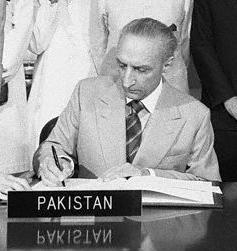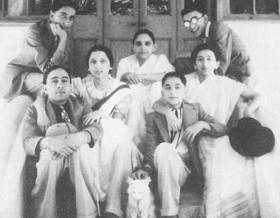 As many people guessed correctly, the person in our most recent ATP Quiz here was a young Sahabzada Yaqub Khan, former foreign minister of Pakistan.
As many people guessed correctly, the person in our most recent ATP Quiz here was a young Sahabzada Yaqub Khan, former foreign minister of Pakistan.
Yaqub Khan was a unique and multi-talented high-achiever – general, statesman, diplomat, intellectual. He was born in 1920 in the Royal Family of Nawabs of Rampur, India. He first joined the Indian Army and when Pakistan got independence, he migrated to Pakistan and continued to serve in Pakistan Army. While serving in Pakistan Army he rose to the rank of a Leutenant General and served in East Pakistan as the Chief of General Staff, Commander Eastern Command. For a brief period of 1 week he also became the Governor of East Pakistan.
After retiring from Army in 1972 Sahibzada Yaqub Khan served as the Ambassador of Pakistan in USA, USSR and France. From 1982 onwards he was designated as Pakistan’s Foreign Minister in different Governments. Between 1992-97 he also served as United Nations Secretary General’s Special Representative for the Western Sahara.
Sahabzada Yaqub Khan is also the founding chairman of Aga Khan University Board of Trustees. In June 2005 Aga Khan University Press published a book called Strategy, Diplomacy, Humanity on the life and work of Sahabzada Yaqub-Khan.
Above all, Shaibzada Yaqub Khan was a “personality” in the true sense of the world. In 2005 Abbas Raza wrote a fascinating profile of Yaqoob Khan in the blog Three Quarks Daily, in which he describes Sahibzada Yaqub as “probably the most remarkable man I have ever met.” His account of his meeting with Sahibzada Yaqoob Khan tells much about the man as well as the icon:
The first time that I met Sahabzada Yaqub Khan about six years ago, he was in Washington and New York as part of a tour of four or five countries (America, Russia, China, Japan, etc.) relations with which are especially important to Pakistan… I had heard and read much about Sahabzada Yaqub and knew his reputation for fierce intellect and even more intimidating, had heard reports of his impatience with and inability to suffer fools, so I was nervous when I walked in. Over the next couple of hours I was blown away: Sahabzada Yaqub was not much interested in talking about politics, and instead, asked about my doctoral studies in philosophy. It was soon apparent that he had read widely and deeply in the subject, and knew quite a bit about the Anglo-American analytic philosophy I had spent the previous five years reading. He even asked some pointed questions about aspects of philosophy which even some graduate students in the field might not know about, much less laymen. Though we were interrupted by a series of phone calls from the likes of Henry Kissinger wanting to pay their respects while Sahabzada Yaqub was in town, we managed to talk not just about philosophy, but also physics (he wanted to know more about string theory), Goethe (SYK explained some of his little-known scientific work, in addition to quoting and then explicating some difficult passages from Faust), the implications of Gödel’s incompleteness theorem, and Urdu literature, of which Sahabzada Yaqub has been a lifelong devotee.
I left late that night dazzled by his brilliance, and elated by his warmth and generosity. Sahabzada Yaqub listens more than he speaks, but when he does speak, he is a raconteur extraordinaire. Since then, I have been fortunate enough to get to know him well, and have spent many a rapt hour in his company. On my last trip to Islamabad, he and his wife and [his son] had me and my wife Margit over for dinner, where upon learning that Margit is from Italy, Sahabzada Yaqub spoke with her in Italian. Then, realizing that she is from the South Tyrol (the German-speaking part of Italy near the Austrian border), he spoke to her in German, giving us a fascinating mini-lecture on German translations of Shakespeare. I can picture him now, emphatically declaiming “Sein oder nicht sein. Das ist hier die frage.”
… Though he has always been fiercely protective of his privacy, politely refusing to write his memoirs despite great public demand (including entreaties over the last few years from me), Sahabzada Yaqub Khan has recently allowed some of his writings to be collected into book form: Strategy, Diplomacy, Humanity, compiled and edited by Dr. Anwar Dil, had its launch earlier this month at a ceremony at the Agha Khan University in Karachi.
…Among other things, Sahabzada Yaqub Khan is a true polyglot: he can speak, read and write somewhere between 6 and 10 languages. While he was governor of East Pakistan, he learned Bengali and delivered public addresses in it, which went a long way toward assuaging their concerns of cultural dominance by West Pakistan. He is also a stylishly impeccable dresser (he was voted best-dressed several years in a row by the Washington diplomatic corps). My greatest joy in his company, however, remains his inimitable explications of the deeper philosophical implications buried in Ghalib’s couplets, of which he has been a longtime and enthusiastic student. In short, he is a man with many and diverse qualities.
 Before formally ending the post I want to share couple of photos of Sahabzada Yaqub Khan. The photo to the left is circa 1922 and Yaqub Khan is sitting in the center. His brother Yousuf is on his right and brother Younus on his left.
Before formally ending the post I want to share couple of photos of Sahabzada Yaqub Khan. The photo to the left is circa 1922 and Yaqub Khan is sitting in the center. His brother Yousuf is on his right and brother Younus on his left.
The photo to the right below is Sahabzada Yaqub Khan in a group of cousins and siblings.
 This photo is circa 1936 and was taken in Masori, India. People sitting Clockwise in the photo are Lady Abdus Samad Khan (mother of Yaqub Khan), Sahabzada Yousuf Khan, Jahan Ara Habibullah (sister), Sahabzada Yaqub Khan, Fakhra (sister), Masood-uz-Zafar (brother in law) and Sahanzada Younus Khan.
This photo is circa 1936 and was taken in Masori, India. People sitting Clockwise in the photo are Lady Abdus Samad Khan (mother of Yaqub Khan), Sahabzada Yousuf Khan, Jahan Ara Habibullah (sister), Sahabzada Yaqub Khan, Fakhra (sister), Masood-uz-Zafar (brother in law) and Sahanzada Younus Khan.




















































Yaqub Khan served a couple of dictators, which one are we griping about this time? the only civilian dictator who suspended the 1973 constitution after it was passed, killed and jailed his opponents regularly & was instrumental in splitting Quaid’s Pakistan or the 4th military dictator who disappeared mid-air in 1988 ?
Yaqub Khan is and will always be a yes-man for the government of the day because he is from the 1st generation of post-partition Pakistani’s who *typically* are devoid of reasonable attitude, accountability & conscience and are responsible for where Pakistan stands today.
Just a thought: All the Presidents/Prime Ministers/Ministers are dictators think about it.They just are so inflated with their own egos.
He is a towering figure. Unfortunately he will be dwarfed in history as the “foreign minister” of General Zia and apologist for Musharraf’s coup.
I to remember meeting him a few times, but very briefly and in large group situations.
He was aloof in a dignified way but not really arrogant. Certainly came across as someone of immense intellectual capacity and of integrity. The type of person you would seek advice from. He served Bhutto as well as Zia, I think largely as a professional doing his job for the country in each case. In neither case was he too close personally to either one and there is nothing I have heard that is about corruption or about personal character or about politicizing his responsibilities.
I remember the General Yaqub Khan’s visit to our mosque in Orange County, California in 1980/81 time frame. He was then the Pakistan’s ambassador to USA. I was then a recent immigrant to the US having left Pakistan after the brutal murder of Bhutto.
In response to my question about dictatorship, he replied as a matter of fact that a country gets a leader it deserves. That meant we the people of the Pakistan deserved to be ruled by the likes of Zia and Yaqub Khan.
It does not matter if general Yaqub Khan spoke six languages. What matters is what he did to the country. There are a lot of interpreters in the UN who speak six languages.